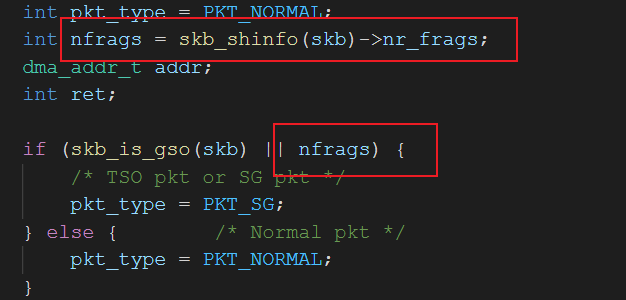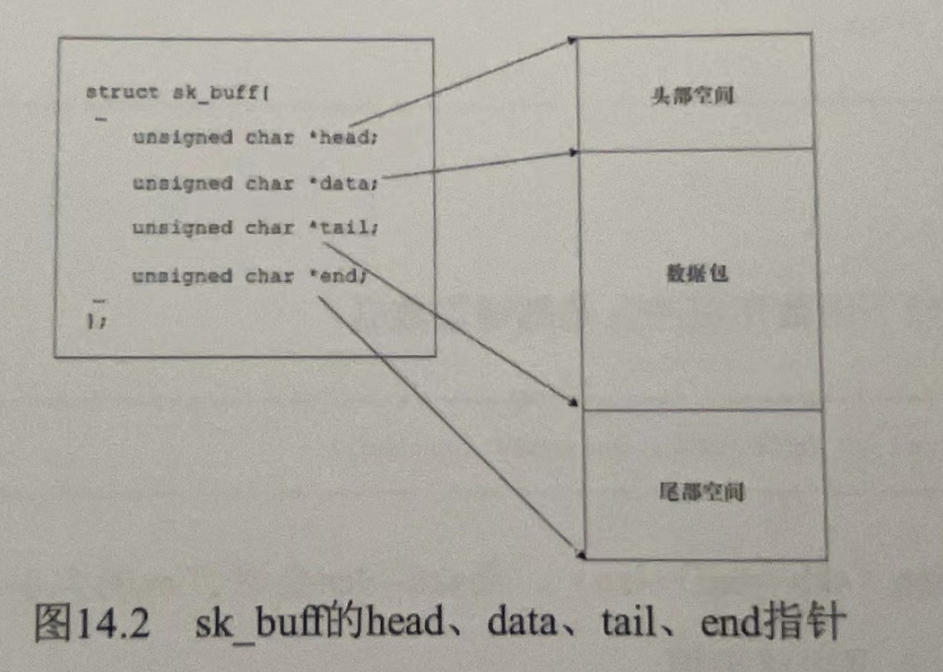前言
最近在看gmac驱动代码,发现很多linux内核网络的api,暂时这里先整理出来,先大概知道什么用法,后续再深入了解
netif_rx
void netif_rx(struct sk_buff *skb);
调用(包括中断期间)这个函数可以通知内核已经收到一个数据包,并封装入一个套接字缓冲区。
netif_rx_schedule
void netif_rx_schedule(dev);
调用该函数通知内核数据包已经存在,并且在接口上启动轮询机制,它只在NAPI驱动程序中使用。
netif_receive_skb与netif_rx_complete
int netif_receive_skb(struct sk_buff *skb);
void netif_rx_complete(dev);
这两函数只在NAPI驱动程序中使用;NAPI中的netif_receive_skb函数与netif_rx等价,它将数据包发送给内核。当NAPI驱动程序耗尽了为接收数据包准备的内存时,则它将重新启动中断,然后调用netif_rx_complete终止轮询函数。
skb_shinfo
通过这个宏来判断数据包是由一个数据片段组成,还是由大量数据片段组成。例如海思的网卡代码

dev_queue_xmit
网络发送函数,最终调用到MAC驱动中的ndo_start_xmit
struct sk_buff
定义在include/linux/skbuff.h,只列举几个比较重要的结构体成员
struct sk_buff {
union {
struct {
/* These two members must be first. */
struct sk_buff *next;
struct sk_buff *prev;
union {
struct net_device *dev;
/* Some protocols might use this space to store information,
* while device pointer would be NULL.
* UDP receive path is one user.
*/
unsigned long dev_scratch;
};
};
struct rb_node rbnode; /* used in netem, ip4 defrag, and tcp stack */
struct list_head list;
};
union {
struct sock *sk;
int ip_defrag_offset;
};
union {
ktime_t tstamp;
u64 skb_mstamp_ns; /* earliest departure time */
};
/*
* This is the control buffer. It is free to use for every
* layer. Please put your private variables there. If you
* want to keep them across layers you have to do a skb_clone()
* first. This is owned by whoever has the skb queued ATM.
*/
char cb[48] __aligned(8);
unsigned int len,
data_len;
__u16 mac_len,
hdr_len;
__be16 protocol;
__u16 transport_header;
__u16 network_header;
__u16 mac_header;
/* private: */
__u32 headers_end[0];
/* These elements must be at the end, see alloc_skb() for details. */
sk_buff_data_t tail;
sk_buff_data_t end;
unsigned char *head,
*data;
};
dev表示当前sk_buff从哪个设备接收到或者发出的。
sk表示当前sk_buff所属的Socket。
cb为控制缓冲区,不管哪个层都可以自由使用此缓冲区,用于放置私有数据。
destructor函数,当释放缓冲区的时候可以在此函数里面完成某些动作。
len为实际的数据长度,包括主缓冲区中数据长度和分片中的数据长度。
data_len为数据长度,只计算分片中数据的长度。
protocol协议。
transport_header为传输层头部。
network_header为网络层头部。
mac_header为链接层头部。
tail指向实际数据的尾部,end指向缓冲区的尾部。head指向缓冲区的头部,data指向实际数据的头部。结构如下图所示:

netif_start_queue
ndo_open中,调用这个函数,来激活设备发送队列
netif_stop_queue
ndo_stop中,调用这个函数,停止设备传输包
eth_type_trans
一般用于网络数据接收中,获取该报文的协议类型。
